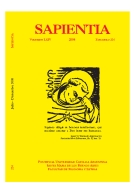Please use this identifier to cite or link to this item:
https://repositorio.uca.edu.ar/handle/123456789/4239| Título: | El laberinto del continuo | Autor: | González Asenjo, Florencio | Palabras clave: | Leibniz, Gottfried Wilhelm, 1646-1716; Dedekind, Richard; DIVISIBILIDAD; CONTINUO; FENOMENOLOGIA | Fecha de publicación: | 2008 | Editorial: | Ponticia Universidad Católica Argentina. Facultad de Filosofía y Letras | Cita: | González Asenjo, Florenco. El laberinto del continuo [en línea]. Sapientia. 2008, 64 (224). Disponible en: https://repositorio.uca.edu.ar/handle/123456789/4239 | Resumen: | Resumen: La expresión “Laberinto del continuo” se debe a Leibniz. Sin embargo, Leibniz carecía de los instrumentos conceptuales necesarios para tratar el tema adecuadamente. La teoría de conjuntos de Cantor hizo posible resolver el problema del continuo de modo satisfactorio desde el punto de vista conjuntista. Se debe atribuir a R. Dedekind una resolución más cabal del problema. No obstante, el autor sostiene que la concepción de éste último tampoco pone de manifiesto todos los aspectos involucrados en el continuo. Abstract: It was Leibniz who coined the expression “The Labyrinth of the Continuum.” Nevertheless, he lacked the conceptual framework to adequately deal with this topic. Cantor’s Set Theory made it possible to solve the problem of the continuum in a satisfactorily from a conjunctionist perspective. But it was R. Dedekind who provided a better solution. Notwithstanding, the author asserts that Dedekind’s approach does not allow explaining all the aspects comprised in the continuum. |
URI: | https://repositorio.uca.edu.ar/handle/123456789/4239 | Disciplina: | FILOSOFIA | Derechos: | Acceso Abierto | Fuente: | Versión original impresa en Sistema de Bibliotecas UCA: Sapientia Vol. LXIV Tomo XLVII, Nº 224, 2008. |
| Appears in Collections: | SAP - 2008 Vol LXIV nro. 224 |
Files in This Item:
| File | Description | Size | Format | |
|---|---|---|---|---|
| el-laberinto-del-continuo.pdf | 181,74 kB | Adobe PDF |  View/Open |
Page view(s)
150
checked on Apr 30, 2024
Download(s)
268
checked on Apr 30, 2024
Google ScholarTM
Check
This item is licensed under a Creative Commons License

